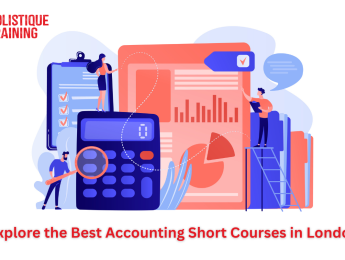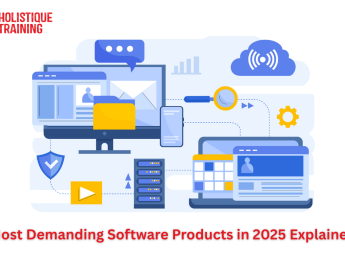- Table of Contents
- 1. Introduction
- Why Take a Short Course in Accounting?
- Upskilling for Career Change or Promotion
- Gaining Specialized Knowledge Without a Full Degree
- Relevance for Small Business Owners
- Flexibility (Weekend / Evening / Online Options)
- Types of Accounting Short Courses in London
- Financial Accounting
- Management Accounting
- Bookkeeping & Payroll
- Taxation & VAT
- Auditing & Compliance
- IFRS (International Financial Reporting Standards)
- Accounting Software (QuickBooks, Sage, Xero, Excel for Accounting)
- Top Institutions Offering Short Accounting Courses in London
- London School of Economics (LSE)
- City, University of London – Bayes Business School
- University of Westminster
- King’s College London – King’s Business School
- London Business School (LBS)
- Holistique Training (London-based Provider)
- Professional Training Providers: LSBF, Kaplan, BPP University
- Community Colleges & Evening Schools
- 5. Comparing Course Formats
- In-Person vs. Online vs. Hybrid Learning
- Evening/Weekend Intensive vs. Part-Time Options
- Certificate vs. CPD-Accredited vs. Professional Diploma
- 6. Costs of Accounting Short Courses in London
- 7. Accreditation & Professional Recognition
- 8. Career Benefits of Short Accounting Courses
- Boost Employability in Finance Roles
- Support Career Switchers
- Enhance Skills for Entrepreneurs and SMEs
- Networking Opportunities
- 9. Tips for Choosing the Right Accounting Course
- Define Your Career Goals
- Match Duration and Budget
- Check Tutor Expertise and Provider Credibility
- Consider Employer Recognition
- Conclusion
1. Introduction
London stands out as a global hub for accounting and finance, home to the City’s financial powerhouse, world-leading institutions, and a diverse network of professionals. The city's blend of academic excellence and real-world immersion draws finance enthusiasts and professionals from around the globe.
In today’s fast-paced world, short courses have emerged as a strategic way to upskill rapidly. They offer targeted learning, flexibility, and practical tools—without the commitment of a full-time degree. Whether you're looking for a concentrated learning experience outside work hours, or a deep dive into specific accounting techniques, short courses deliver.
Who stands to benefit?
- Students aiming to bolster their accounting foundation or explore career paths in finance.
- Professionals seeking promotion or hoping to pivot into accounting roles without full retraining.
- Entrepreneurs and small-business owners needing the confidence to manage finances, taxation, and compliance.
In this article, we will explore why short accounting courses are so impactful, the types of courses available, top institutions in London offering them (with direct links to each), format comparisons, costs, accreditation, career benefits, and guidance to choose the right course for your goals.
Why Take a Short Course in Accounting?
Upskilling for Career Change or Promotion
Whether aiming to move from operations into a finance role or climb the ladder within accounting, short courses provide a practical and efficient route to acquire new competencies. They bridge the gap between current expertise and future ambitions, offering credible credentials for career advancement.
Gaining Specialized Knowledge Without a Full Degree
Unlike traditional degrees, these courses target niche areas—such as IFRS, taxation, or management accounting—with laser focus. This means you can address skill gaps, tackle exam preparation, or refine expertise quickly and cost-effectively.
Relevance for Small Business Owners
If you're running or launching a small business, having even foundational accounting knowledge is a game-changer. Short courses empower you to handle bookkeeping, understand balance sheets, manage payroll, and stay compliant—helping your business run more smoothly and confidently.
Flexibility (Weekend / Evening / Online Options)
One of the greatest strengths of short courses is flexibility. Many providers offerevening or weekend classes to accommodate working professionals, while others offerfully online or hybrid learning, making it possible to study from anywhere, at your own pace. The modern mix of delivery methods allows you to learn without disrupting your daily life.
Types of Accounting Short Courses in London
Financial Accounting
These courses teach the essentials—the language of business. You’ll learn how to record transactions, prepare financial statements, and interpret income statements, balance sheets, and cash flow reports. LSE’s Principles of Accounting (AC110) Summer School is a classic example.
Management Accounting
Focuses on using accounting data for internal decision-making. You’ll explore cost analysis, budgeting, variance analysis, and performance evaluation—critical tools for managers. LSE’s Managerial Accounting and Financial Control (AC101) summer course offers exactly this.
Bookkeeping & Payroll
Learn the practical aspects of daily recording—ledgers, payroll processing, VAT, and reconciliations. These foundational skills are indispensable for roles like accounts assistant and are often available through community colleges and training providers.
Taxation & VAT
Courses in this category dive into the specifics of UK tax systems, including income tax, corporate tax, and VAT, guiding you through compliance and effective reporting.
Auditing & Compliance
Ideal for those looking to enter audit roles or ensure legal and procedural compliance. Expect to cover audit methodologies, ethical standards, and risk frameworks.
IFRS (International Financial Reporting Standards)
IFRS-focused courses teach international standards essential for global businesses. Holistique Training, for example, emphasizes IFRS practical corporate training.
Accounting Software (QuickBooks, Sage, Xero, Excel for Accounting)
Hands-on software courses provide proficiency in tools widely used in business. Providers like Future Connect offer targeted training in QuickBooks, Sage, Xero, and Excel.
Top Institutions Offering Short Accounting Courses in London
London School of Economics (LSE)
Overview: LSE offers highly respected Summer School and Executive Education programmes in accounting and finance, known for their academic rigour and global recognition.
Course Highlights: Popular options include Principles of Accounting (AC110) and Financial Statement Analysis (AC210), which combine real-world case studies with a solid theoretical foundation.
Duration: Summer School courses usually run for three weeks with around 54 contact hours. Executive courses vary from days to weeks.
Who It’s For: Undergraduate and postgraduate students seeking strong fundamentals, and professionals looking to enhance their analytical skills.
City, University of London – Bayes Business School
Overview: Bayes (formerly Cass Business School) is well-known for its executive short courses in finance and accounting, designed to combine academic insight with business practicality.
Course Highlights: Offers executive education modules lasting a few days, with both in-person and online formats. Topics cover financial analysis, corporate finance, and decision-making.
Duration: Typically, 2–5 days for executive courses.
Who It’s For: Professionals, executives, and finance practitioners aiming to gain focused skills quickly.
University of Westminster
Overview: Westminster provides professional development through short courses in accounting, finance, and related business areas. Many modules are CPD-accredited and credit-bearing.
Course Highlights: Includes modules such as Financial Reporting and Analysis and practical financial management.
Duration: Flexible, ranging from several weeks to modular formats.
Who It’s For: Students, graduates, and professionals seeking to strengthen their accounting knowledge with practical and affordable training.
King’s College London – King’s Business School
Overview: King’s Business School offers executive education programmes that often include finance, governance, and accounting-related content, blending academic depth with applied business knowledge.
Course Highlights: Programmes focus on finance for managers, corporate governance, and business leadership with accounting elements.
Duration: Varies—typically a few days to a couple of weeks.
Who It’s For: Mid-level to senior professionals looking to develop strategic financial and business management skills.
London Business School (LBS)
Overview: LBS is a world-leading business school offering top-tier executive education. Its short finance courses focus on accounting, strategy, and financial leadership.
Course Highlights: Accounting and Financial Analysis is one of the most popular, designed to help participants interpret financial statements and use them for decision-making.
Duration: Short, intensive formats—usually 5 days.
Who It’s For: Senior managers, consultants, and executives who need to understand financial data for strategic decision-making.
Holistique Training (London-based Provider)
Overview: A professional training provider in London, Holistique specialises in practical corporate training for finance and accounting professionals.
Course Highlights: Courses include Understanding IFRS, Strategic Financial Management, and Financial Analysis for Decision-Makers. They are CPD-accredited and designed with hands-on case studies.
Duration: Most courses are delivered in 2–5 days, with post-training support.
Who It’s For: Finance professionals, auditors, and corporate managers seeking to apply international standards and improve financial reporting skills.
Professional Training Providers: LSBF, Kaplan, BPP University
LSBF (London School of Business & Finance)
- Overview: Offers a variety of online and in-person short courses covering accounting, finance, and reporting, alongside preparation for ACCA and CIMA.
- Link: LSBF – Finance & Accounting Short Courses
Kaplan Financial
- Overview: One of the UK’s largest professional training providers, Kaplan offers AAT, ACCA, and CIMA exam preparation through short intensive classes.
- Link: Kaplan – Accounting Qualifications
BPP University
- Overview: Specialises in professional development and exam-focused training, especially for ICAEW ACA, ACCA, and CIMA.
- Link: BPP – Accounting and Tax Courses
Community Colleges & Evening Schools
Overview: Local colleges and adult education centres across London (such as City Lit and Morley College) provide affordable short courses in bookkeeping, payroll, and introductory accounting.
Course Highlights: Practical training in bookkeeping, Sage, QuickBooks, and small business accounting.
Duration: Usually 6–12 weeks, part-time in the evenings or weekends.
Who It’s For: Beginners, small business owners, or individuals seeking affordable entry-level training.
Link: City Lit – Bookkeeping & Accounting Courses
5. Comparing Course Formats
When choosing an accounting short course in London, one of the most important factors is the format of delivery. Learners have different needs depending on their career stage, availability, and preferred style of study. Below, we break down the three main aspects of course formats, each followed by a comparison table.
In-Person vs. Online vs. Hybrid Learning
Choosing the right delivery mode is crucial for balancing flexibility with engagement.
Format Type | Delivery Mode | Best For |
In-Person | Classroom-based | Learners who value networking and hands-on interaction |
Online | Self-paced/distance | Professionals needing flexibility or international access |
Hybrid | Mix of online + in-person | Those who want flexibility with occasional peer interaction |
Evening/Weekend Intensive vs. Part-Time Options
Scheduling matters just as much as content. Short, intensive courses allow rapid upskilling, while part-time formats provide room for deeper reflection.
Format Type | Delivery Mode | Best For |
Evening/Weekend | Short intensive blocks | Working professionals with limited time |
Part-Time | Spread over weeks/months | Learners seeking gradual, in-depth engagement |
Certificate vs. CPD-Accredited vs. Professional Diploma
The level of recognition can significantly affect your career prospects. Certificates show initiative, CPD accreditation supports ongoing development, and diplomas align with professional qualifications.
Format Type | Delivery Mode | Best For |
Certificate | Short, entry-level | Beginners or those testing the waters |
CPD-Accredited | Flexible/Hybrid | Professionals maintaining CPD requirements |
Professional Diploma | In-depth, structured | Career changers or learners preparing for ACCA/CIMA/ICAEW |
6. Costs of Accounting Short Courses in London
The cost of accounting short courses in London varies widely depending on the provider, duration, and level of study.
- Community Colleges & Adult Education Centres: Prices often start from as little as £200–£500, making them accessible for beginners or small business owners.
- Professional Diplomas & Exam Prep Courses: Mid-range courses, such as AAT or ACCA modules, typically cost between £500–£1,500 depending on study support and materials.
- Executive & University-Based Programmes: At the top end, institutions like LSE or London Business School charge £2,000 or more for prestigious short executive courses.
Scholarships & Employer Sponsorship: Many professional training providers and employers support learners through funding, discounts, or instalment payment options, particularly when the course directly enhances job performance.
Return on Investment (ROI): While the upfront cost may seem high, short courses often provide a rapid return. Gaining new skills can lead to salary increases, faster promotions, freelance opportunities, or the ability to manage business finances more effectively. The value gained often outweighs the cost in the medium to long term.
7. Accreditation & Professional Recognition
Accreditation is a key factor when selecting an accounting short course in London. Recognised certifications add credibility and ensure employers respect the qualification.
- CPD Certification: Many short courses are CPD-accredited, meaning they count toward Continuing Professional Development. For professionals in finance, maintaining CPD hours is often a regulatory requirement.
- Links with ACCA, CIMA, and ICAEW: Leading providers such as Kaplan and BPP align their courses with professional accountancy bodies. Completing these courses can either prepare you for, or provide exemptions from, formal qualifications such as ACCA (Association of Chartered Certified Accountants), CIMA (Chartered Institute of Management Accountants), and ICAEW (Institute of Chartered Accountants in England and Wales).
- Preparation for Professional Exams: Short courses build a foundation in topics like IFRS, management accounting, and taxation, helping learners succeed in exams and progress through professional qualification routes more efficiently.
This combination of CPD points, exam alignment, and professional recognition ensures short courses are not just an academic exercise, but a meaningful career asset.
8. Career Benefits of Short Accounting Courses
Enrolling in a short accounting course can provide substantial career advantages, whether you are just entering the field, seeking promotion, or running your own business.
Boost Employability in Finance Roles
Employers value candidates who show initiative in updating their skills. Adding a recognised short course to your CV demonstrates commitment, adaptability, and technical competence.
Support Career Switchers
For those moving into finance from other industries, short courses act as a bridge. They deliver core knowledge in financial reporting, auditing, or taxation, and provide confidence to apply for accounting-related roles without having to complete a full degree.
Enhance Skills for Entrepreneurs and SMEs
Small business owners often need to manage bookkeeping, cash flow, and tax compliance themselves. A targeted short course in accounting or accounting software equips them with the tools to run their businesses more effectively and avoid costly errors.
Networking Opportunities
Studying in London, one of the world’s leading finance hubs, also opens doors to a valuable network of peers, lecturers, and industry experts. This network can be just as important as the knowledge gained, offering potential partnerships, job opportunities, and professional support.
In short, short courses deliver both practical knowledge and career-enhancing connections, making them a smart investment for professionals at any stage.
9. Tips for Choosing the Right Accounting Course
Selecting the best course depends on aligning it with your career ambitions and circumstances. Here are four key tips:
Define Your Career Goals
Decide whether you want to build basic bookkeeping skills, prepare for a professional exam, or develop executive-level financial analysis. Clear goals will guide your choice.
Match Duration and Budget
Short evening or online courses may be ideal if you are balancing work, while more intensive programmes are better for fast-tracking progress. Always check total costs and factor in potential ROI.
Check Tutor Expertise and Provider Credibility
Choose providers with strong reputations in finance education, such as LSE, Kaplan, or Holistique. The expertise of instructors ensures you receive practical, relevant insights.
Consider Employer Recognition
Opt for courses accredited by CPD or linked to ACCA, CIMA, or ICAEW for maximum career value. Employers are more likely to support or reward training that aligns with professional standards.
By applying these tips, you can confidently choose a course that fits your needs and advances your professional journey.
Conclusion
London remains one of the world’s top destinations for short accounting courses, offering unmatched access to prestigious institutions, professional training providers, and affordable community options. Whether your goal is to gain a new skill, prepare for a professional qualification, or enhance your career prospects, there is a course to suit every learner.
Short courses are practical, flexible, and globally recognised—making them ideal for students, professionals, and entrepreneurs alike. From CPD-accredited evening classes to executive-level programmes at LSE and LBS, the range of options in London ensures that every learner can find a programme tailored to their ambitions.
Now is the time to take action. Explore the institutions and providers highlighted in this article, match them to your personal goals, and invest in your professional growth. The knowledge, skills, and networks you gain today will open new doors tomorrow.
Explore top providers and start your accounting journey in London today.
























